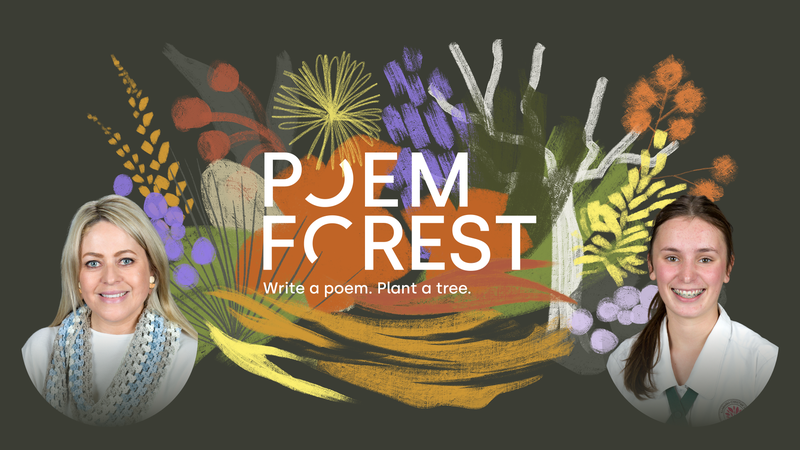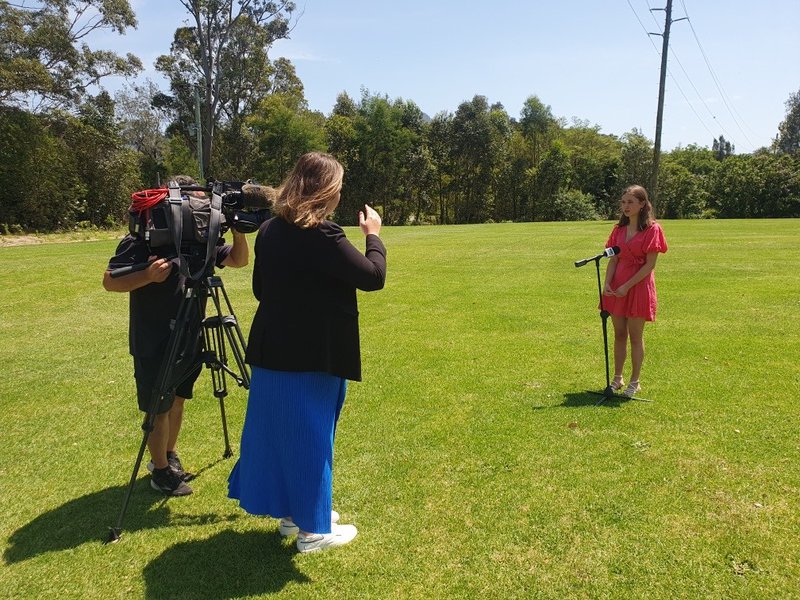Secondary English teacher Mrs Kate Wilkinson and Year 11 student Jayda Brain have been acknowledged as two of eight winners in Red Room Poetry's 2023 POEM FOREST prize for their outstanding submissions to the competition.
Mrs Wilkinson's and Jayda's poetry submissions were selected as winners from over 6,400 nature poems from all around Australia, with each submission contributing to the planting of native seedlings in schoolyards, parks, along local streets and in Tiny Forests all around the Wollongong LGA on Dharawal Country.
The competition's organisers, in conjunction with the Wollongong City Council, identified that the Wollongong LGA has some of the lowest canopy cover in NSW, and that planting native trees will provide habitats for native plants and animals, increase climate resilience, and contribute largely to creating a better future for all.
Mrs Wilkinson has been recognised as the overall winner of the 'Accredited Teacher' category of the prize, with Jayda crowned the winner of the Wollongong Community Greening Local Prize, a category open to Wollongong students from Kindergarten through to Year 12. Read their poems and hear what the pair had to say below.
Mrs Kate Wilkinson – 'Mallacoota'
Mrs Wilkinson said she wasn't originally planning on entering the competition, but did so as a 'very last-minute decision' when she realised there was a teacher category.
"I write lots of poetry and bits of fiction here and there, and I was already working on a story which had a section that could be adapted easily into a poem," she said.
"So I tweaked the opening of my story to fit the word limit and clicked 'submit'."
Perhaps evidently from the title of the poem, it's about the regional Victorian town of Mallacoota, which, alongside much more of Australia's East coast, was ravaged by the devastating bushfires in 2019.
Mrs Wilkinson also referenced a story much closer to home – and to heart – as a source of additional inspiration for her submission, while observing the rejuvenation of the bushfire-devastated areas was a particularly influential stimulus that shaped the overall theme of her poem.
"Friends of ours in another community of Batemans Bay almost lost their home in these fires and they were forced to wait at the beach nearby to save their lives," she said.
"I was inspired by the resilience of God’s creation; the way it regenerates and restores itself in a way that we as humans can really learn from.
"It is a metaphor for the struggle of humanity to overcome adversity."
Mrs Wilkinson's submission received some high praise from the judges, noted for its hopeful, thoughtful and optimistic nature. Here's what the judges had to say:
"‘Mallacoota’ tells an important story, and I loved the optimism towards the ending - reminding us that tragedy doesn’t last."
– Hannah Fairbrother, 2022 POEM FOREST Upper Secondary winner.
"[It brings] to life the harsh reality of bushfires in a gentle and thoughtful poem."
– Clarence Slockee, Gardening Australia presenter and Cudgenburra/Bundjalung Aboriginal man.
"This poem evokes hope, something that we desperately need in these times of the climate crisis and the injustice it brings. We are told of the atrocities of the “oppressive heat”, but we know that the earth will heal, with hope breaking through. The personification of the flames and of the earth elucidate the pain that comes before calmness, before we collectively mobilise, make ourselves aware of what is happening to nature to have hope for justice."
– Varsha Yajman, climate justice and youth mental health advocate.
As a prize for her winning poem, Mrs Wilkinson received $500 in cash, a book pack, a poster from the Wollongong City Council, and a poetry journal, as well as her winner's certificate.
'Mallacoota' by Mrs Kate Wilkinson
It begins like the rain often does.
A hesitant kiss - so light and tender that you are unsure if you felt it on your skin at all.
The ash begins to float in.
A tiny fragment of grey dust at first, then a flake of a forgotten tree.
A waft of burnt sap comes next - sickly sweet and hanging heavy like spilled syrup in some faraway swagman’s pan.
The dense, oppressive heat becomes a swirling wind; taunting the long-suffering trees, stripping them of the last of their curled and tortured leaves.
The sky transforms: a hazy grey of thick, murky soup splintered with flecks of amber.
The firestorm rolls in.
Mother Earth burns now,
but soon there will be rest and she will heal.
Saplings will break through;
hopeful and ready to hold up the sky.
Jayda Brain – 'the forest along the M5'
Jayda's decision to enter the POEM FOREST competition was because of a nature poem she'd previously written, which she hoped to 'spin in a different direction'. But once she started adjusting the existing poem, Jayda found that she had an entirely unique one on her hands.
"When I started fiddling with it, it turned out to be completely different from the original," she said.
"I decided to cut all my characters and make nature itself the focus. I found this also allowed the reader to place themselves within the poem."
Jayda noted that a key source of inspiration behind what she wrote was the David Attenborough documentary "Life on Our Planet", which she found to be particularly evocative.
"It made me think about what my local area will look like in the next 20 to 30 years," she said.
"Will all the things that I appreciate, like the birds in the trees and the creek behind my backyard, still be there?"
Similarly to Mrs Wilkinson, a key theme in Jayda's poem is how nature is restorative and rhythmic.
"I’ve always always found it crazy how old the earth is," Jayda said.
"It has been performing the same cycles for hundreds of thousands of years. Nature learns from itself; learns from the past.
"I started wondering how different our world would be if humans learned from the past as well as nature does. Would we be better caretakers of the environment?
"I decided that yes, we would."
Judges were equally impressed with Jayda's poem, applauding its vivid descriptions of nature, which are contrasted by depictions of man-made things.
"This poem skillfully juxtaposes the serenity of nature with the toxicity of the industrialised world."
– Varsha Yajman, climate justice and youth mental health advocate.
"Hope seems to be a common thread in nature-inspired poems, and ‘the forest along the M5’ utilised this so incredibly well. I loved the merging of vivid and heart-felt description with a powerful wake up call to learn from our past and act for our future."
– Hannah Fairbrother, 2022 POEM FOREST Upper Secondary winner.
"A lovely reminder to look out the window!"
– Georgina Reid, writer and founding editor of Wonderground.
Jayda said she was 'super excited' upon finding out about her win, while Mrs Wilkinson was equally thrilled for Jayda as she was for her own win.
"It was lovely to receive notification I had won the teacher’s writing category, but I was even more excited when I heard Jayda won the senior student category!" She said.
"What an honour to share this success with her! She is a true talent."
As a prize for her winning poem, Jayda received $500 in cash, a $50 gift voucher from the Wollongong Botanic Garden, and a book pack, as well as her winner's certificate.
'the forest along the M5' by Jayda Brain
next to the highway, leaves grow like hands opening,
their veins telling an ancient story.next to the highway, bird calls sing age-old hymns,
a choir fluttering in the wind.next to the highway, seeds scatter like constellations,
points on the map of time.you can read history books in tree rings.
you can trace rivers back to their origins.you can watch lizards flit between sticks,
instincts passed down through generations.next to the highway, the soil is braided
with charcoal; the ferns browning & half
buried. streams choked with sprigs
of plastic, bird calls stifled by the thickening
air. above it all: a grey sky collapsesunder its own toxic weight.
you can’t turn back time.
you can’t undo what has already been done.but nature has learned its rhythms from the past.
perhaps we can learn from it too.




